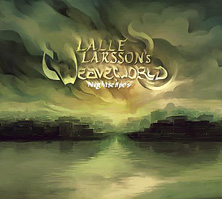 Some
of the finest 20th century Scandinavian electric instrumental jazz-rock
fusion artists began their major musical breakthroughs 35 years ago
in Sweden and now at the end of 2012 a rising wave of Swedish musicians
are finally making themselves heard. Having worked earlier in bands
Agents Of Mercy and Karmakanic, keyboardist Lalle Larsson is
improving his stature as a solo artist with his 2012 CD Nightscapes,
which features Lalle joined together with his band called Weaveworld.
A lot of music has come and gone, some sadly forever over the
past 2008-2012 period. One of the greatest names from the first era
of 20th century progressive European jazz-rock fusion, (although a
name not entirely familiar to many of the new generation of Eurock
fans), from neighboring Finland, Pekka Pohjola died just over four
years ago on November 27th 2008. For those music fans, young and old,
seeking renewed inspiration, one listen to Nightscapes makes
it clear that this current breed of innovative artists are moving
fearlessly forward into the brave new world of 21st century music.
Interestingly, Lalle’s music on Nightscapes sounds to
these ears to be as thematically inspired, and as sonically heavy,
as Pekka’s late period albums such as Pewit, from 1997.
Performing one intense, eclectic instrumental fusion track after the
next, Lalle’s band is certainly up to the task, and the Nightscapes
album features stellar support from Jonas Reingold (bass),
Richard Hallebeek (guitars), Stefan Rosqvist (guitars)
and Walle Wahlgren (drums). Recently, Lalle also worked with
U.K. guitar ace Phi Yaan-Zek and if you enjoyed Lalle’s work
with Phi, especially on the 2012 CD release of Phi’s latest solo
album, Deeper With The Anima, you'll thoroughly enjoy the similarly
adventurous soundscapes of Nightscapes. Perhaps Lalle’s
vision of tomorrow’s music today sounds just as much influenced
by 21st century prog-rock as it is does to first wavers, going back
to Pekka Pohjola and Mike Oldfield in 1976, yet listened to as a whole
album experience, Nightscapes is the perfect soundtrack to
a thrilling sonic experience. www.LalleLarsson.com
Some
of the finest 20th century Scandinavian electric instrumental jazz-rock
fusion artists began their major musical breakthroughs 35 years ago
in Sweden and now at the end of 2012 a rising wave of Swedish musicians
are finally making themselves heard. Having worked earlier in bands
Agents Of Mercy and Karmakanic, keyboardist Lalle Larsson is
improving his stature as a solo artist with his 2012 CD Nightscapes,
which features Lalle joined together with his band called Weaveworld.
A lot of music has come and gone, some sadly forever over the
past 2008-2012 period. One of the greatest names from the first era
of 20th century progressive European jazz-rock fusion, (although a
name not entirely familiar to many of the new generation of Eurock
fans), from neighboring Finland, Pekka Pohjola died just over four
years ago on November 27th 2008. For those music fans, young and old,
seeking renewed inspiration, one listen to Nightscapes makes
it clear that this current breed of innovative artists are moving
fearlessly forward into the brave new world of 21st century music.
Interestingly, Lalle’s music on Nightscapes sounds to
these ears to be as thematically inspired, and as sonically heavy,
as Pekka’s late period albums such as Pewit, from 1997.
Performing one intense, eclectic instrumental fusion track after the
next, Lalle’s band is certainly up to the task, and the Nightscapes
album features stellar support from Jonas Reingold (bass),
Richard Hallebeek (guitars), Stefan Rosqvist (guitars)
and Walle Wahlgren (drums). Recently, Lalle also worked with
U.K. guitar ace Phi Yaan-Zek and if you enjoyed Lalle’s work
with Phi, especially on the 2012 CD release of Phi’s latest solo
album, Deeper With The Anima, you'll thoroughly enjoy the similarly
adventurous soundscapes of Nightscapes. Perhaps Lalle’s
vision of tomorrow’s music today sounds just as much influenced
by 21st century prog-rock as it is does to first wavers, going back
to Pekka Pohjola and Mike Oldfield in 1976, yet listened to as a whole
album experience, Nightscapes is the perfect soundtrack to
a thrilling sonic experience. www.LalleLarsson.com
mwe3.com presents an interview
with
LALLE LARSSON
mwe3: When I was listening to Nightscapes I started
to think back to all the great Swedish musicians over the past 45
years. How do you explain the phenomenon of Swedish instrumental jazz-rock
and fusion music? What do you think about some of the great Swedish
legends from Bo Hansson though to the Finnish-Swedish connection and
history, Pekka Pohjola, Ragnarök, Samla / Zamla, Stefan Nilsson.
I kind of hear that same level in your new CD. You must be very proud
of the Nightscapes CD.
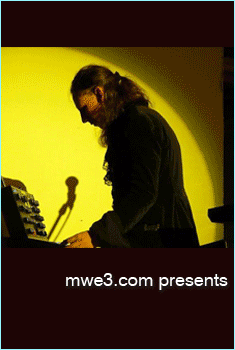 Lalle:
Is there a phenomenon of Swedish instrumental jazz-rock and fusion
music? If that is the case I´m happy to hear that it's happening
somewhere because it sure ain't happening over here. The only thing
you get over here in Sweden is Eurovision song contest, X-factor,
Idol and weird shit like that.
Lalle:
Is there a phenomenon of Swedish instrumental jazz-rock and fusion
music? If that is the case I´m happy to hear that it's happening
somewhere because it sure ain't happening over here. The only thing
you get over here in Sweden is Eurovision song contest, X-factor,
Idol and weird shit like that.
The names you mentioned are probably more known outside of Sweden,
and maybe more so in the 70’s. To be honest I’m not really
familiar with the music of the names you mentioned, but I see their
names in foreign magazines sometimes...but not in the Swedish press
or media. Which is a shame because there is probably a lot of creative
Swedish music that never gets heard over here. I know that Stefan
Nilsson has written some really nice film music.
I do think that Swedish professional musicians overall hold a very
high standard, even internationally, but if you are trying to do your
own thing in this country then it is more difficult to get any interest.
If there are any instrumental jazz fusion bands over here then you
never get to hear about them unfortunately.
There has been some great, inspiring and original voices coming from
Sweden over the years who have made an impact, people like Jussi Björling,
Jan Johansson, Yngwie Malmsteen, Mats/Morgan, Meshuggah, and a couple
of classical composers from the 60’s, all doing their own thing
on a world class level, thinking out of the box, that is inspiring,
but I wouldn't say it's because they are Swedish but more because
they have believed in their music, practised hard, and kept going
no matter what.
A lot of underground artists make their living by playing in other
countries where they have more of a following. The Swedish music scene
is very conventional and pop-oriented. Music for children is also
very popular over here, even among adults, with artists such as Sean
Banana and Markoolio getting a lot of attention. People also seem
to like bad poetry sung over three chords.
mwe3: How old are you now, where and when did you grow up,
say for instance during what musical period? What was your early exposure
to music like, who were your first favorite artists and what instruments
did you study growing up? Do you still practice music every day?
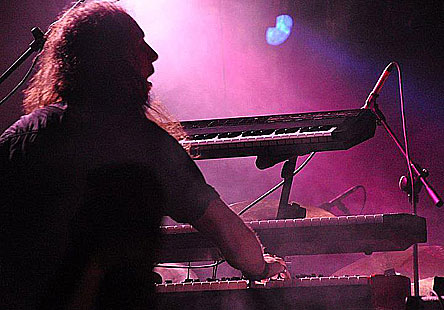 Lalle:
I am 38 years old so I grew up in the mid-eighties, early nineties.
I was born in the south of Sweden and both my parents worked in showbusiness,
so there was always a lot of music around the house.
Lalle:
I am 38 years old so I grew up in the mid-eighties, early nineties.
I was born in the south of Sweden and both my parents worked in showbusiness,
so there was always a lot of music around the house.
My mother got me into classical music very early and my father played
a lot of showtunes and musicals from the American songbook. So my
first musical experiences was from the music of Bach, Mozart, Chopin
and Frank Sinatra. The very first cassette tape that I bought was
Frank Sinatra live with the Count Basie Big band.
When I was 12 years old, as most kids, I got into all the bands that
was popular at the time... “The new wave of British Heavy Metal”,
and I studied drums for a couple of years, joined the drum corps for
a while which really helped my reading and learning about rudiments,
etc. Then as a teenager I discovered guitarist Yngwie Malmsteen's
early albums that mixed metal with classical music. Because of my
classical background I could relate to that and that got me into practising
obsessively on the piano. That music also got me into other guitar
oriented bands and instrumental music like Allan Holdsworth and later
saxophone players like Charlie Parker, John Coltrane and Eric Dolphy
who really got me into chords, scales, music theory, jazz and improvisation.
I was also influenced by the harmonies in the music of the old Bond
movies, many years later I found out that the music was written by
the brilliant composer John Barry.
After my father died, when I was 14, I became a total practiseoholic
and just played all the time. I didn´t care much about school
because I already knew that I wanted to become a musician, there was
no other choice really...
When it comes to practising I am always trying out new concepts, scales,
harmonic movements, always working on new things. I feel as if I have
only just started, I hear so much stuff in my head that I can’t
play yet, so I am constantly working on it. It’s a bit frustrating
but it is also what keeps me going.
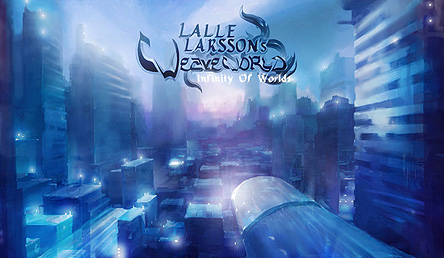 mwe3:
How and when did the Nightscapes recording and writing sessions
take form and take place? Where was the album recorded and can you
say something about who you recorded the album with and something
about the guitarists and drum/bass on the CD? What were some of the
guitars used? The guitars are superbly recorded by the way.
mwe3:
How and when did the Nightscapes recording and writing sessions
take form and take place? Where was the album recorded and can you
say something about who you recorded the album with and something
about the guitarists and drum/bass on the CD? What were some of the
guitars used? The guitars are superbly recorded by the way.
Lalle: The "Weaveworld Trilogy" has been an ongoing
process for many years. Some compositions are older and some are new.
My idea for Weaveworld in the first place was to have more of a band
sound, so I have used the same musicians on all three albums.
I handpicked the band for this project. Drummer Walle Wahlgren with
his energetic blend of old school and modern playing was a perfect
fit. Jonas Reingold was my first choice as a bass-player because he
is so all-round and he understands where I’m coming from. Whether
it's distorted bass played with a pick or a lyrical melody on the
fretless bass, he has it all covered. Guitarist Stefan Rosqvist delivers
that rock/metal edge and energy that is needed in some of the compositions.
I have known Stefan for over 20 years now so we also share a lot of
the same influences in the rock department. He always knows what sounds
I’m after.
As the lead instrument playing themes and solos I needed someone with
a strong sense of timing, jazz sensibilities and someone who could
play freely over chord changes. My old friend Dutch guitarist Richard
Hallebeek was the guy for this. Rich nails my scores and phrasing
every time, he really has that shit down to perfection and he is a
hard worker. He did an amazing job on Nightscapes doubling
all those complex keyboard themes and arrangements and adding his
own touch to it as well.
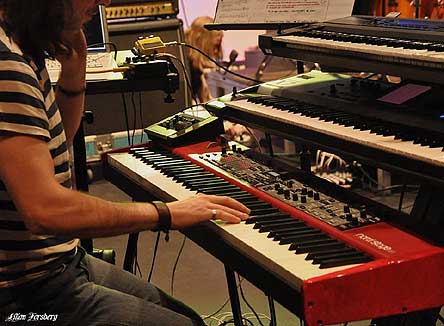 I wrote
all the scores and did the pre-production for Nightscapes last
year and we began recording the drums in May 2012. The bass, guitars
and additional keyboards were done in June-August and me and Jonas
had the album mixed and mastered in August right before I went on
a European promo tour as the support act to The Flower Kings in September.
I wrote
all the scores and did the pre-production for Nightscapes last
year and we began recording the drums in May 2012. The bass, guitars
and additional keyboards were done in June-August and me and Jonas
had the album mixed and mastered in August right before I went on
a European promo tour as the support act to The Flower Kings in September.
mwe3: How would you compare Nightscapes with your other
CD releases and how has your music evolved over the years?
Lalle: Well, first of all I'm really happy to have these albums
out of the way. To be honest I feel that I should have released the
"Weaveworld Trilogy" fifteen years ago, but at that time
I didn't have the means to do that. No record label, no money, couldn’t
afford the right equipment and I didn't have the right connections
to release and produce albums like this. There are demos of some of
the music on the first Weaveworld album that goes back as far as 1992.
Today it is easier and cheaper to do albums and almost everyone has
a laptop and a homestudio. I am also very grateful to be able to release
my music on Reingold Records. It’s great to have all these talented
friends, and we play on each others projects to make things happen
on a shoestring budget. Otherwise we wouldn't afford to do albums
like this.
I think that the Weaveworld trilogy should be listened to as a whole,
and in a perfect world all three CDs should have been released as
a CD box all at once, but it is more profitable to release three separate
discs, one every year.
For about ten years, when I wrote more avant garde music (Seven
Deadly Pieces and Marimba pieces), I always heard from
people that my music was difficult, non-melodic and weird. So with
Weaveworld I wanted to show a more melodic and accessible side of
my composing.
I see Nightscapes as a bit of a closure of a musical period
in my life. Especially the track “Nightscapes Suite”, I
think encompass all the elements of my past recordings – Ominox,
Seven Deadly Pieces, Weaveworld etc. to where I'm heading in the
future.
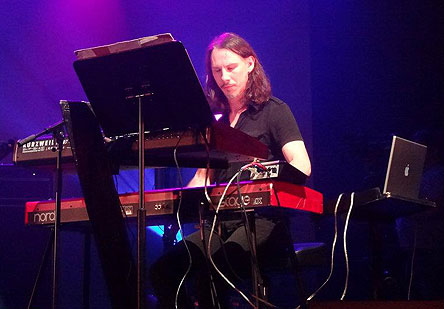 mwe3:
Can you compare recording instrumental music with a more vocal based
sound?
mwe3:
Can you compare recording instrumental music with a more vocal based
sound?
Lalle: I would say that it is mostly a question of instrumentation.
The main priority in, for instance, more traditional pop oriented
vocal music is the vocal melody and the story telling. In that case
the comp instruments should underline and support that, but it all
depends on the music really. In some modern music the vocals can be
used as an effect or a noise instrument. When I listen to Ligeti’s
madrigals the voice is used more as one of the instruments, weaved
into the different counterpoints. So it really depends on the composition.
mwe3: What is your keyboard set up like on the album? Do you
collect old keyboards and other electronic devices and sounds or do
you prefer the more modern ones? Also do you prefer to record live
versus say using vast amounts of overdubbing and is there an advantage
one over the other?
Lalle: My keyboard set up is really based around what I can
afford at the moment. On the first Weaveworld album I only had cheap
old equipment to work with and on Nightscapes I think I have
better keyboard sounds because I managed to buy this new Nord Stage
88 which is great.
Apart from that I'm using mostly sounds from my laptop which has Logic
with some plug-ins. It works for some stuff, but I'm never satisfied...
I am always looking for the sounds that I hear in my head, and it
takes time to find a palette of sounds that are unique and expressive.
The more traditional piano, rhodes, organ and that kind of stuff usually
works even though you can’t really get the warmth of the real
instruments but you can work with the timbre and produce something
that emotionally sounds like a piano but is something else.
I like the organic sounds of wind instruments, violin, guitar and
the expression you can get from those instruments with bends, glissando
and vibrato. I guess that I will try and spend the rest of my life
trying to phrase and sound more like those instruments, but it is
frustrating, it feels like I'm trying to play organic beautiful expressive
stuff on a distorted bagpipe.
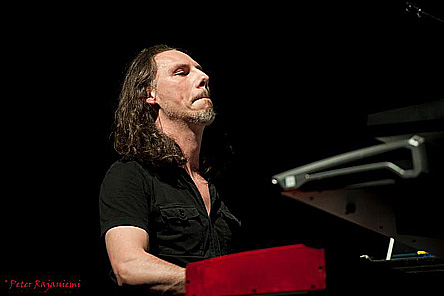 When it
comes to recording I really think that you lose something in overdubbing.
If it is metronomic notated arrangements the music doesn’t really
suffer from it, but if you are overdubbing solos you lose some of
the live interaction and you can never get that magic happening as
you can if you record one take together in the studio. My best recorded
playing is definitely recorded live in one take.
When it
comes to recording I really think that you lose something in overdubbing.
If it is metronomic notated arrangements the music doesn’t really
suffer from it, but if you are overdubbing solos you lose some of
the live interaction and you can never get that magic happening as
you can if you record one take together in the studio. My best recorded
playing is definitely recorded live in one take.
The reason why we do overdubs is simply because I can't afford to
book a big studio and get everyone together in the same room. Rehearsals,
plane tickets, engineer etc... it is just too expensive for a project
like this. It is just one of those compromises that I have to make
when there is no real cash involved.
mwe3: Would you describe your sound as being progressive instrumental
rock or jazz-rock fusion? Which genres of music have the biggest impact
on you and what artists today interest you as a composer and musician?
Also can you say something about recording Deeper With The Anima
with U.K. guitarist Phi Yaan-Zek? What was making that amazing
CD like and how did you meet Phi?
Lalle: To me it is all just music. I understand that it is
easier to be put into a category and a genre, but to me it is all
about just putting sounds to an emotion or realizing a mood that I
have in my head, telling a story. If we take a song like “Nightscapes
Suite” there are elements of rock in that I’m using riffs
and distorted bass and guitar motifs. It also has elements of jazz
in the way that we improvise over chords and superimpose scales and
chords from many different keys. I am also using a lot of techniques
from classical music such as 12-tone counterpoints, recurring themes
and arpeggiated harp-like sequences on the piano. Some parts are quite
cinematic with simple themes and pop-like melodies. It is hard to
put this music into a genre.
 A
lot of the time people also confuse instrumentation with genre. If
you would orchestrate Stravinsky´s Rite Of Spring for
distorted bass, guitars and a drum kit would it still be considered
classical music? Progressive rock? I don´t know. I tend to get
inspired and influenced by musicians who create their own genre and
their own musical world.
A
lot of the time people also confuse instrumentation with genre. If
you would orchestrate Stravinsky´s Rite Of Spring for
distorted bass, guitars and a drum kit would it still be considered
classical music? Progressive rock? I don´t know. I tend to get
inspired and influenced by musicians who create their own genre and
their own musical world.
There is so much great music out there. My latest discoveries was
probably french composer Henri Dutilleux, especially his violin concerto
played by Isaac Stern, and composer Joseph Schwantner which inspired
some of the parts in “Nightscapes Suite”.
I recorded my keyboards for Phi Yaan Zek's Deeper With The Anima
back in 2011 when I visited him in the UK. We were just hanging out
as usual and in the evenings I did some keyboard overdubs to his album
which was released in 2012.
Phi is one of my oldest and closest friends. I met him 20 years ago
in Vienna where we both studied at the American Institute Of Music.
Over the years we have inspired each other. For many years we sent
each other cassette tapes back and forth and if it wasn’t for
Phi I would never have heard of people like Conlon Nancarrow, Slonimsky
or of certain drum & bass, avant garde thrash metal, Indian music
etc... and I turned him onto Mats/Morgan and some Swedish stuff. Phi
has been a constant inspiration for new music.
We used to copy cassette tapes on double speed and fill a 60 minute
tape with the most extreme Coltrane solos and guitar solos played
back on double speed. Sometimes backwards on double speed. And we
would walk around with headphones listening to that stuff on repeat,
and it is amazing how the mind works because after a while it all
sounded perfectly normal to our ears. It made me practise even harder
to try to achieve that sound, trying out different two handed techniques
to get that mystical beautiful otherworldly sound. We were totally
living it. (lol)
mwe3: How has Nightscapes been received so far and what
plans do you have moving the album forward into 2013? Do you have
other projects coming and can you say something about other interesting
things happening in Sweden this winter 2013? Is there snow on the
ground in dear old Stockholm?
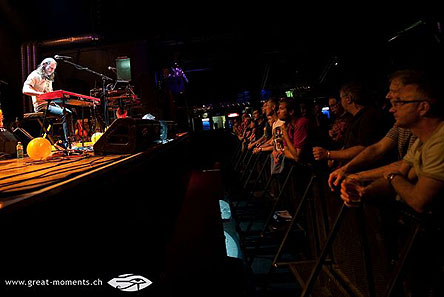 Lalle:
It seems like Nightscapes has been received really well so
far and the sales are as expected compared to the previous albums.
Reviews are always mixed, some reviews for the latest album have been
the best so far out of the three CD’s, and some reviewers are
not really educated in this kind of music so they try to compare the
music to vocal-prog music which is a totally different thing. To be
honest I don’t really care too much about reviews, whether it
is good or bad. I already know what turned out the way I wanted and
what didn’t, so the most important thing is that I'm satisfied
with the recording and that I did the best I could at the time. Although,
by the time an album is out I have already developed new things so
when I listen back to the music, I hear that I could have done it
so much better today. It’s hard for me to listen to my older
stuff sometimes because of that.
Lalle:
It seems like Nightscapes has been received really well so
far and the sales are as expected compared to the previous albums.
Reviews are always mixed, some reviews for the latest album have been
the best so far out of the three CD’s, and some reviewers are
not really educated in this kind of music so they try to compare the
music to vocal-prog music which is a totally different thing. To be
honest I don’t really care too much about reviews, whether it
is good or bad. I already know what turned out the way I wanted and
what didn’t, so the most important thing is that I'm satisfied
with the recording and that I did the best I could at the time. Although,
by the time an album is out I have already developed new things so
when I listen back to the music, I hear that I could have done it
so much better today. It’s hard for me to listen to my older
stuff sometimes because of that.
My plan for 2013 is to record my next solo album which will be more
focused on my keyboard playing. My two projects Seven Deadly Pieces
and the "Weaveworld Trilogy" was all about composition and
notated arrangements. Now I feel it is time to do a raw live recording
in the studio with me stretching out and improvising over chord changes,
a more traditional solo album I suppose. I have already written about
ten songs for keys, bass and drums. These compositions are based around
a lot of different unusual scales and chord clusters. Concepts that
I have been working on for many years now. A vehicle for improvisation.
I will spend the beginning of this year in the practise room again
to be able to play freely over all those chords. It is a real challenge.
I am also playing the keys for Richard Hallebeek´s new CD RHP
II which was just released on the 6th of January. It's a great
jazz fusion CD with guests such as Randy Brecker, Greg Howe, Guthrie
Govan, Kiko Loureiro, Andy Timmons, Alex Machacek, Jose de Castro
and Eric Gales. If you are a guitar and fusion fan you can´t
afford to miss this album. It also features the great rhythm section
of Frans Vollink – bass and Sebastiaan Cornelissen – drums.
 We
will also begin to work on some new material for the next Agents Of
Mercy album with Roine Stolt. Later this year there will be a DVD
release from Karmakanic – Live at RosFest, a live show
we did in the US last year. There will also be a live DVD with Agents
Of Mercy this fall. So a lot of exciting projects will be released
this year.
We
will also begin to work on some new material for the next Agents Of
Mercy album with Roine Stolt. Later this year there will be a DVD
release from Karmakanic – Live at RosFest, a live show
we did in the US last year. There will also be a live DVD with Agents
Of Mercy this fall. So a lot of exciting projects will be released
this year.
I also hope to do some gigs and clinics with my own music. It feels
like 2013 could be an exciting year and I feel that I'm turning the
page and heading into new musical territories. I don't know about
Stockholm but over here in the south of Sweden the snow has melted
away. Thanks for taking the time and please visit my facebook
page for the latest news and reingoldrecords.com to check out the
latest releases.
Thanks to Lalle Larsson @ www.LalleLarsson.com
and to Reingold
Records



